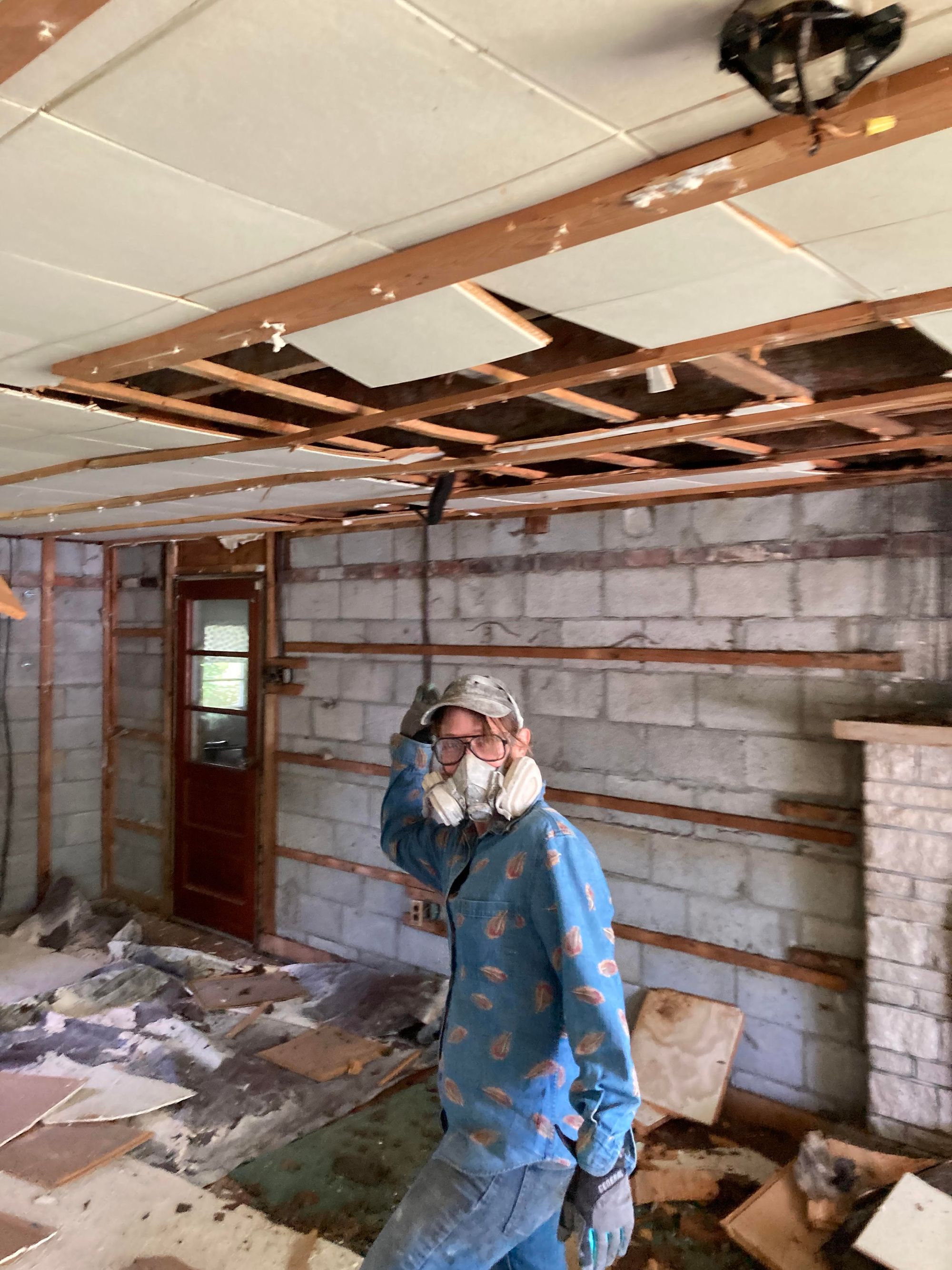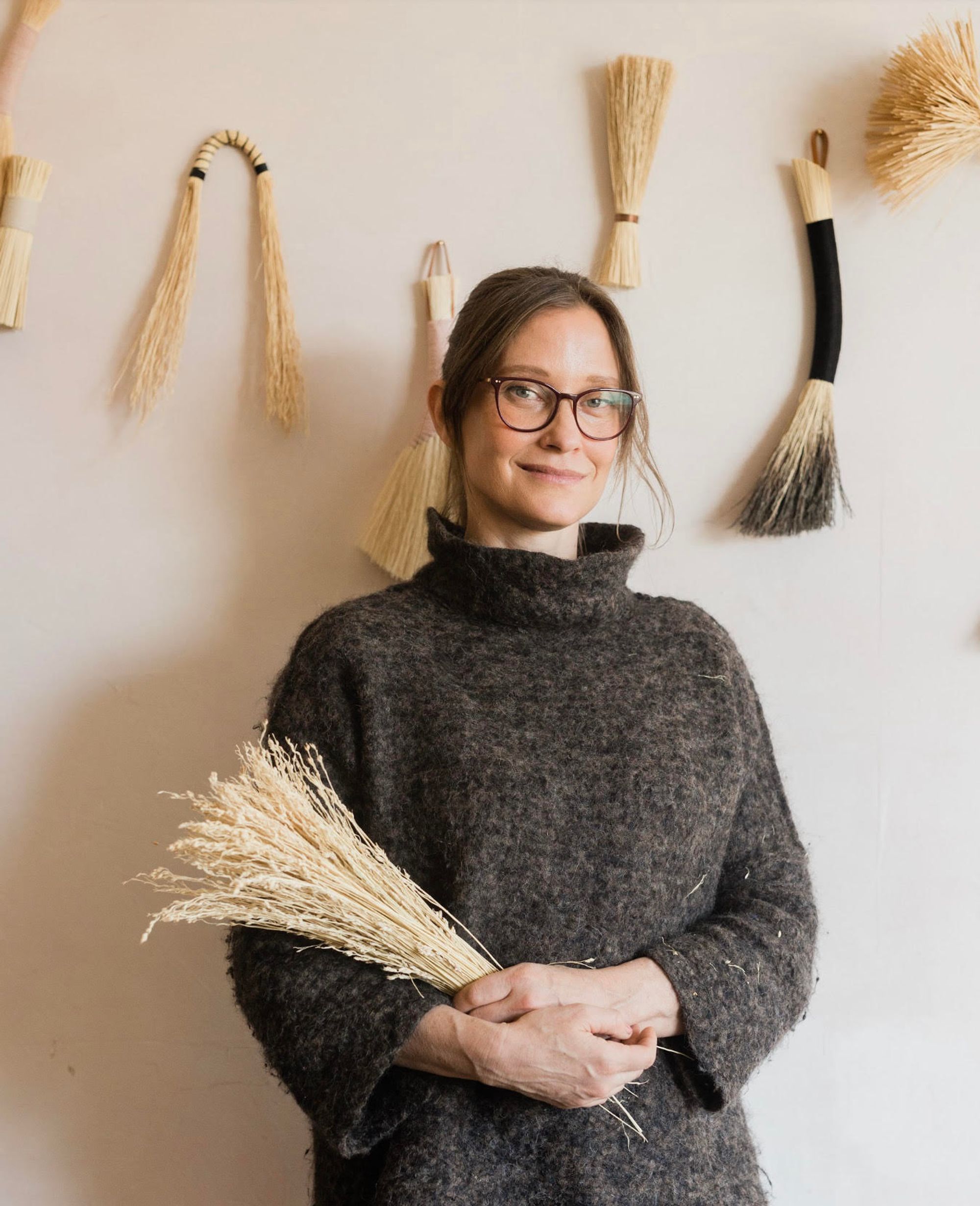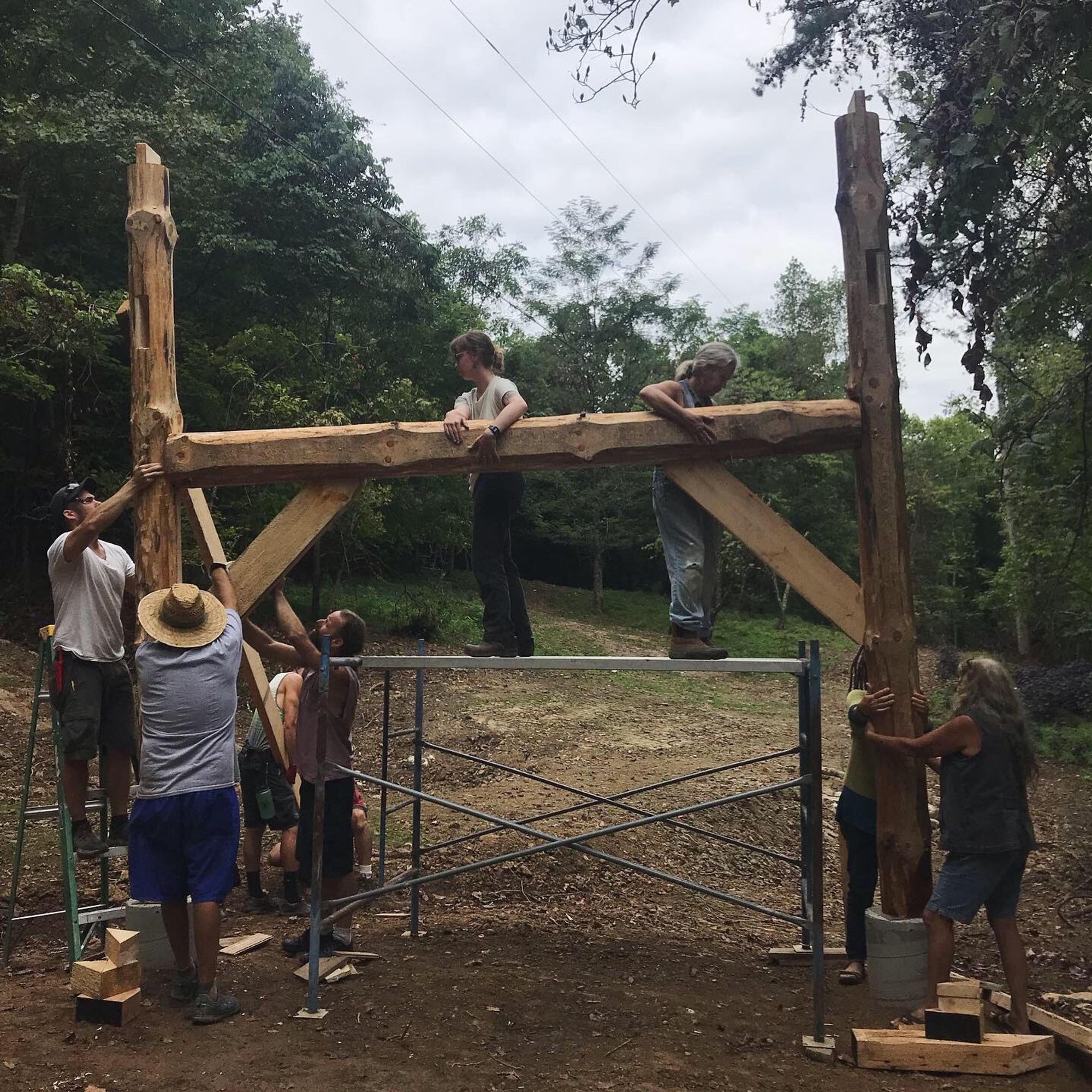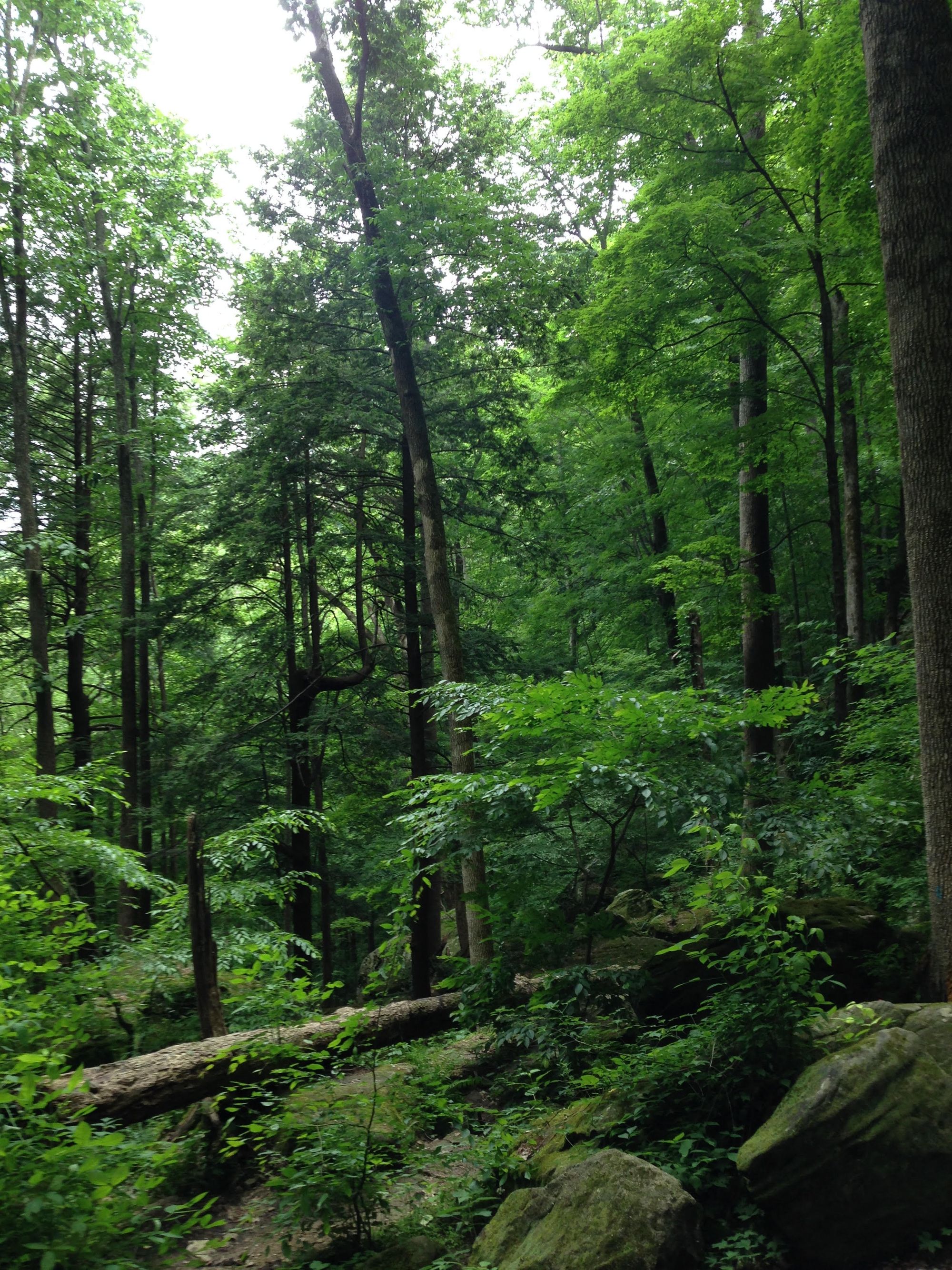New Era American
Cynthia Main
Craftsperson and Business Owner
Berea, Kentucky
Made in America
Jul 19, 2023

Origins
Tell me where you are and what you're doing.
My name is Cynthia Main, and I currently live in Berea, Kentucky. It's a town of about 17,000, about a 45 minute drive south of Lexington. It's in the Appalachian Mountains, and I run a small batch manufacturing slash art house with a focus on sustainability and traditional craft tools called Sunhouse Craft.
I have a combination of natural drive for making things and for finding a more harmonious way of working. If you want to call it sustainability, that's okay. I think that word has been ruined, personally.
Why?
It’s used as a glossy branding move rather than taking on care and community. “Care” for all aspects of a business is a way of doing business -– not just a nice add on.
Berea, Kentucky. Are you from there? How'd you get there?
I'm not. I mostly grew up in Raleigh, North Carolina. Berea itself is the arts and crafts capital of Kentucky. As the older crafters in this town were retiring and the craft community was sort of disappearing, the city proposed a program where they would give you a studio and a stipend for a year in hopes you would move your craft business here. And I did that either four or five years ago. It was the pivotal year. I was farming in rural Missouri. I would go work in a cabinet shop when I would run out of money and I would sell out at shows, but I kind of couldn't break out of that triangle without an opportunity like this. So it was pivotal for my business, helping me embed and meet people in the community.
I make a lot of brooms by hand. I personally make thousands of brooms a year, but we make a lot of wooden wares, housewares for the home, dustpans. I really love making things completely by hand. Can you do that in the modern marketplace? You know, the answer for me is yes-– spoiler alert!
The wood and materials are all local, even the broom corn is grown here. I love when something looks like a place and is a place. And I think a lot of our work reads that way. It's funny how surprising it is in contrast to a lot of the more modern, easily accessible things. I can definitely remember when I first started going to shows, people would just stop and stare in front of the booth like, “What is going on? This is so traditional, but not.”
My husband Doug works with me, and we have three studio assistants to come a few days a week to help. We have a studio and a storefront and we probably wholesale to about 75 shops around the country and sell online and sell out of our storefront.
Do you keep a very clean store since you have so many brooms?
No, surprisingly. The storefront is very clean but my shop looks like a barn at all times. There's so much making happening! We sweep every day. You can’t see it but there is a giant pile of stuff around me.

Lifestyle
Tell us about your daily rituals.
I think it's important to say the ones that I'm not proud of: I wake up and I scroll Instagram. It's something that I'm trying to break. Have I spent a lot of time learning meditation? Yes. Do I work out in the mornings? Yes. Do I have a structured routine? I do. But I think it’s good to talk about the things we aren’t proud of otherwise things can seem unrealistic.
That was the most embarrassing thing I could have shared.
When does a ritual become an addiction?
Oh yeah. It can cross that line! I meditated 2 hours a day for years. These days… 10 minutes a day. Now I wake up and tell my dog that I love him and I'm happy to have another day with him.
Craft
What is your craft? What medium do you work in?
I've worked in lots of fabrication mediums. I currently make a lot of brooms. I still engage in a fair amount of woodworking.
Why brooms?
I was a woodworker and I ran a teaching shop that was part of a job training program for formerly incarcerated folks in Chicago. And I got really burnt out on power tools. My entire life I've been trying to weave together art, sustainability, craft making. We did a lot of bar renovations in Chicago with reclaimed wood when that was in vogue. One of them asked if I could make a barrel. That was so exciting to my brain! I went down the rabbit hole of traditional coopering for barrel making and left my job to go study at a traditional rural skill school called Tillers International. I opened a small cooperage with a friend after that.
I took a broom making class on a lark. The teacher, Darryl Francis, said, “You could do this for a living.” It was instantly fun and it required no setup. That is the nice thing about traditional craft. You really are working so much with just your hands and really simple tools. So I just kept making them. I did make a decision then to move to an intentional community that was intentionally no tech, so no power tools, no running water, no electricity for a couple of years.
Where?
Northeast Missouri, the Possibility Alliance. I spent the warm months there, so I would leave for about three months out of the year because, quite literally, I lived in a hammock with all my belongings below me. I wanted to learn better communication skills, which living on a commune gives you time to practice. It was also an opportunity to just work on all hand tools with everything we were building. Missouri is the wild west of natural building because there's no building codes up there.

Identity
When you think, do you think as an I or a we?
To a fault, I would say collective. It is hard for me to sometimes find myself in the story. That is both a problem and an asset in a lot of ways because there's a lot of freedom with feeling unseen, to just be able to pursue whatever because you're just kind of free. But I feel an extremely close tie with the world, the universe as a whole, and I'm very motivated by the needs of others.
Sometimes in America there's a weird tension between being in a highly individualistic culture that also has a lot of communal spirit. Do you sometimes find yourself at odds with other people or ways of being in this country or place?
No. I mean, I love the sandwich. This country is really funny. I mean, catch me at different times in my life and I'd give you a very different answer. But stably in my forties, I can say I love the sandwich of it. I love just the mismatch of people. I love the diversity. I can't believe it all gets to coexist.
It's interesting that you call the country a sandwich.
That's how I think about it. I was born in New Zealand. My family is American. But my great grandparents emigrated on the other side. We definitely always semi-identified as immigrants or outsiders. Maybe it's growing up in the South, too. I love that I grew up in North Carolina. I love the mix of people and opinions I got to grow up with. And I feel very Southern in my identity. I am also something that the South produces, you know what I mean?
It's a complicated place, though.
Find me somewhere that isn't. Especially in what we call the United States.
Spirituality
And are your neighbors worthy of your love?
Yes. Oh, yeah.
Do you know your neighbors?
Yeah. Oh… is that an unusual response?
Community leaders even, they still struggle with it. But let me ask you one more question about spirituality...
In the words of Leo Strauss, progress or return?
I think the two are somewhat inseparable, but I guess you could always call it progress. It’s a question of your perspective. My perspective is that there's perennial questioning, perennial destruction, perennial seeking. And I would like to see more progress in the sense of a deepening connection.
But in some ways, because you work in a traditional art form, there must be a sense of going back to move forward.
Maybe I'm a slow student, but I understand things primarily through my body and my hands. Sure we can have this conversation and I'm okay at it, but it isn’t my primary method for understanding things.
What undergirds your worldview?
I think it's joy and feeling interconnected to all life.
Do you have a spiritual tradition that informs that, or is it something else?
It's quite literally how I feel. I love learning about mystics or seekers. There are so many people in this category, Thomas Merton, Dietrich Bonhoeffer. People who transcribe a sense of being. There were years I spent devoted to study. I’m not seeking it, it’s seeking me. It’s like my number one motivation, that feeling.
How do you feel? Is it in your body? Is it in your mind? Is it in your hands? How do you feel?
I am an electric being. People often comment, “How do you get so much energy? You get so much done!” I feel like this interconnected electrical being. I’ve definitely never said that in an interview! I'm extremely on fire for life, you know?
We start with brooms, and we end with electromagnetic beings.
That is finally correct. All of the work attempts to respond to that feeling. I got to take a class with Drew Langsner, who is a traditional crafter who resurrected traditional craft in this country. He was saying that craft is the meeting of animal, vegetable and mineral, where you're the animal, the material you're working with is the vegetable and your tool is the mineral. Anything is achievable if all those things are in balance. As I go deeper into craft, the growth curve opens up and I realize it's endless. It begins to feel a bit transcendental, like how can I reinterpret this experience into my daily life? I feel a strong kinship with the Shakers for that reason.

Meaning
Do you practice what you preach?
Yes. I don't preach much and I practice daily, so that's pretty easy to do. I don't think we're living in a utopia currently. You know, “utopia” means “no place.” I think there is a long bridge and I'm comfortable with the long game.
Knowledge
Do you think knowledge is created or discovered?
What is knowledge? I think it's understood. I pursue craft, so I practice the same thing over and over and over and over again. But it is not the same any time. Knowledge is the bank of experience.
America
What is an American dream and what is an American nightmare?
I mean, I think the American dream is still the classic: emigrate here with nothing, moving from a place of chaos into a place of peace. And the American nightmare is the reverse, a veneer of peace descending into chaos.
Do you feel American?
Yes.
What does that mean?
I could have gone back to New Zealand, even though I didn't grow up there. We moved here when I was eight months old. Do I feel American? Yeah. Sometimes I'm on calls with friends who craft in other countries, and they’re like “You're so ambitious!” We're so gregarious.
But also the craft I choose to practice these days on a daily basis, on a yearly basis, they came to being through the melting pot of America, this craft mashup, this mashup of necessity, invention, tradition.
I carry on that same tradition of necessity, invention, tradition. I am also an entrepreneur. I feel the freedom to make a living as an artist. Those are things that not every place in the world, in my opinion, gets to experience, the individualism of that.
I also live in a small town now, where the mayor waves in the storefront when he goes by on the front of the fire truck in the 4th of July parade. Berea came up around the first coeducational interracial college in the South. That's why the town here and its students do not pay to go to school here. The desire to see a better society drove the creation of this town.
I do think it's complicated talking about what is America. Someone just put up a flag and called it America in someone else's homeland. It's complicated. But at the same time, yes, I feel American.
Is Berea exceptional for the South?
Yes and no. There's a lot of ways this town is really exceptional. I've always found the South to be much more of a melting pot than other places. But maybe that's the corners of the South that I grew up in. I grew up in Raleigh, right around Research Triangle Park, so there were tons of international people. The high school I went to was bananas diverse, even as a public school, like, my experience of the South has been super diverse. Probably not everyone's experience, but it's more than just mine.
In some of the inventories we’ve done in the South, race is both a constant and produces almost like an EKG of awareness.
I counter, in what place have I ever been where that's not the case? Many places I go in the North are so white. To me, it's shocking. So it's like, “Oh, you mean you're in a place where people actually live together in diverse ways?” I know that's true in the bigger cities like New York. But get out of that and you're in these smaller places that for me feel really foreign, really white, and people are talking to me about how I’m from a racist place. This is awkward.
The hottest button for me is just a constant barrage of depictions of Southerners being equated with dumb. I am just over it. I'm tired of it. And this is what we've always done as a country, right? To proclaim one vein of knowledge as being superior. And it just really frustrates me.
It frustrates me when people misunderstand others’ experiences. But I mean, I've done it! Off subject, but I had the opportunity to go to Nicaragua when I was in high school to learn about the IMF and World Bank. And this is really embarrassing again, to admit I didn't realize this but I thought people who were living in poverty weren’t smart which is completely untrue. This is so shameful to say out loud but I forgive myself because I was like 14 or 15. But you talk to people and you realize it's not the case. I see people constantly like pandering or putting on a Southern accent when they want to seem dumb, when they want to blow off the blame.
Who do you think is the biggest perpetrator of that?
It's so pervasive in our culture. It’s easier to “other” people you don’t want to engage, because otherwise you have to work on understanding them. Understanding people forces you to access parts of yourself that are the same and that is a hard conversation for many people.
I think feeling “better than” is something that America and capitalism relies on in some nefarious ways. I think there's excellent aspects to those systems, but like any system or tool used incorrectly, it's not the greatest. That's a casualty of some of the systems that we have put in place as a country.
Your People
Have you ever made a collective decision?
Oh, my God. So many consensus meetings. Yes, I've made many. I've been in many. Like so many. It pains me to go to one now. There's two examples, one being the furthest back I can think of, when I was 20-ish. We were planning for a street action for Reclaim the Streets in Chapel Hill. There was a brief blip in American protests where you would have a block party out of nowhere to invigorate a community and show alternatives. Celebration as protest. I remember that we figured it out and we did it. Hammering out all the details, who's going to be what. There was a budding, human desiring for a better thing, it was thrilling and exciting and took hours to execute.
And then my latest disappointment. I was on a political committee here in town about the arts, and just after a year, we had still gone nowhere. We had done nothing outside of the committee, partly because we were trying to reach consensus. And I love the committee. I love what we are aiming for. I think the people on it are all great, but we could not move the bus forward.
Why?
I think because we meet only once a week. And because we would get close to a decision but then someone would feel like, “maybe not every faction is on board” or “this isn't an inclusive enough scope.” I agree with those comments and I agree with those things. However, this is my entrepreneurial spirit. I'm much more of a “let’s get the bus going and we'll solve it on the way” kind of person.
I like to be nimble. And I love consensus for certain things. But I also think living on communes for four years, I have a little bit of trauma over endless meetings.
The siren's call of consensus is hard.
Yes. The ultimate goals that people have are excellent. But like I said, I'm a “yes and” person. I'm like, “Yes, and… let's get this going!”